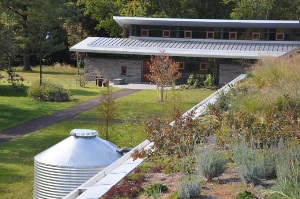Feb 28 2011
The first Ivy League university to be part of the American College and University’s President’s Climate Commitment now has its first LEED Platinum facility.
The $13 million Horticulture Center at the University of Pennsylvania Morris Arboretum opened in October 2010 and just achieved Leadership in Energy and Environmental Design (LEED) Platinum certification, the highest rating given by the U.S. Green Building Council. It is the second not-for-profit LEED Platinum project in the state of Pennsylvania. The 20,840 square foot, multi-building Horticulture Center is located at Bloomfield Farm, a 70-acre site within the larger Morris Arboretum. The project is part of the last key component of the university’s 1977 masterplan for a modern botanical garden.
 Horticulture Center at the University of Pennsylvania
Horticulture Center at the University of Pennsylvania
The Horticulture Center serves arboretum staff and includes four separate facilities. The office building has work stations for 28, plus conference rooms and a staff lounge. A mechanic’s shop and garages are adjacent to the office building, and there are two carpentry shops. Overland Partners Architects of San Antonio, Texas, led the design team, which included local landscape architecture firm Andropogon Associates and m2 architects. Penn challenged Overland Partners to create a “forward looking” building of national significance that incorporates the highest standards in sustainable principles while maintaining a modest budget in keeping with the modest building size.
The Horticulture Center is an important demonstration project for sustainable features that will be increasingly adopted across the Penn campus as part of the university’s Climate Action Plan. Penn President Amy Gutmann was the first Ivy League university president to sign the American College and University’s President’s Climate Commitment, and Penn’s Climate Action Plan is an outcome of that pledge.
“The Horticulture Center presented a perfect opportunity for us to actively pursue aspects of every goal in our Climate Action Plan. The new center will use 40% less energy than conventionally-built facilities, we diverted 75% of construction waste from landfills, and we achieved the highest level possible of LEED certification,” said Dan Garofolo, Penn Environmental Sustainability Coordinator. “Perhaps most importantly, the Horticulture Center is a functioning example of the level of sustainability that is possible; it will certainly lead by example and raise the bar for all other new buildings at Penn.”
Some of the sustainable features of the Horticulture Center include:
-
Geothermal heating and cooling, ample daylighting, and operable windows, to reduce the overall demand for electricity throughout the year
-
Rainwater harvesting for use in landscape irrigation and toilet flushing
-
Highly flexible and durable facility which is designed to accept changing technology
-
Rooftop photovoltaic (PV) panels and solar hot water collectors provide on-site renewable energy that would otherwise come from the utility power grid
-
Green roofs, planted with indigenous, low-maintenance plants, mitigate storm water runoff and reduce the heat island effect
-
Recycled content included in the project’s steel, concrete and other materials constitutes more than 20 percent, by cost, of the total building materials used
-
Locally-sourced building materials and construction debris recycling
“The new space provides the infrastructure needed to match the tremendous growth the Arboretum has experienced over the past 30 years and to address future expansion of the institution,” said Paul Meyer, director of the Morris Arboretum of the University of Pennsylvania. “The ‘green’ elements of the Horticulture Center serve an even greater function, by providing unique opportunities to educate the public about the importance of protecting our natural resources. By building a Horticulture Center that is LEED Platinum certified, we are continuing the tradition of respecting nature and harvesting the natural resources of the land to build a renewable future.”
The Morris Arboretum is a 166-acre historic public garden and educational institution with winding paths and colorful gardens that include a formal rose garden, sculpture garden, Japanese garden, garden railway, and a 450-foot long canopy walk that transports visitors 50 feet up into the treetops. It opened its doors to the public in 1933 on land donated by wealthy Quaker siblings Lydia and John Morris. Today, the Morris Arboretum is listed on the National Register of Historic Places and is the official arboretum of the Commonwealth of Pennsylvania.
The Horticulture Center at the Morris Arboretum of the University of Pennsylvania is one of numerous arboretum-related commissions for Overland Partners. The firm completed the Lady Bird Johnson Wildflower Center at the University of Texas in Austin, winner of more than 10 regional and national design awards; Overlook Pavilion at The Arboretum at Penn State University, winner of a Texas Society of Architects’ 2010 Design Award; and the Holden Arboretum Visitor Center outside of Cleveland, Ohio and the Botanic Gardens of Western Pennsylvania, both currently in design. Other higher education projects within the firm’s design portfolio include the new Business School Building at Baylor University in Waco, Texas; the new Academic Building at the University of North Texas at Dallas; the new Student Activity Center and the new College of Liberal Arts at the University of Texas at Austin; the new Continuing Education Center at Rice University in Houston; and the School of Architecture and Landscape Architecture at Pennsylvania State University in State College, Pennsylvania.
Source: http://www.overlandpartners.com/